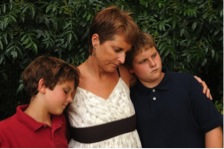Talking to Children about Death and Dying
February 16, 2015As difficult as it may be to talk to a child about the loss of a loved one, children not only deserve the truth, but need to hear the truth in order to maintain a sense of trust with the adults around them. Moreover, children need to hear the truth in language that they can understand and in concrete terms.
 According to Donna Schuurman, EdD, FT, Executive Director of The Dougy Center for Grieving Children, children want, need, and deserve the truth. “In over 30 years of providing grief support to thousands of children and teens at The Dougy Center for Grieving Children & Families, we have never heard a child say, ‘I’m glad I was lied to.’ Many, however, struggle with anger and lack of trust toward parents or other adults who lied to them. When we don’t tell the truth, they learn that we cannot be trusted.”
According to Donna Schuurman, EdD, FT, Executive Director of The Dougy Center for Grieving Children, children want, need, and deserve the truth. “In over 30 years of providing grief support to thousands of children and teens at The Dougy Center for Grieving Children & Families, we have never heard a child say, ‘I’m glad I was lied to.’ Many, however, struggle with anger and lack of trust toward parents or other adults who lied to them. When we don’t tell the truth, they learn that we cannot be trusted.”
Here are some additional tips adapted from the book 35 Ways to Help a Grieving Child available from The Dougy Center:
- Answer their questions, even the difficult ones: As an adult, one of the most important things you can do for grieving children is to let them know that any question is acceptable to ask and to answer their questions truthfully. Children ask questions about death because they’re curious about something they don’t understand. Be sensitive to their age and the language that they typically use in their everyday lives. Use concrete words such as “died” or “killed” instead of ambiguous phrases such as “passed away.” If a child hears “Dad passed away” or “We lost your father,” the child may be expecting that his father will return or simply needs to be found.
- Talk about the person who died: Remembering the person who died is part of the healing process. One way to remember the person who died is simply to talk about him or her. It’s fine to use the person’s name and to share what you remember. Bringing up the name of the person who died gives children permission to share their own feelings about the deceased. Sharing a memory reminds children that the person who died will continue to live in their memories and will have a lasting impact those left behind
- Listen in a non-judgmental way: One of the most helpful ways an adult can help a grieving child is to listen to his or her experiences without judgment, evaluation or jumping in to fix the situation. While well-meaning, adults may try to comfort a child by saying, “I know just how you feel,” or give advice such as “get over it” or “move on.” Such responses deny the child’s own experiences and feelings. Use open-ended questions as children are more likely to share their feelings without pressure to respond in a particular way. In this way, adults validate children’s experiences and emotions, helping them to regain a sense of safety, balance and control.
For more information visit The Dougy Center which also provides helpful tip sheets for caregivers.
Additional resources
There are many useful books, websites and tools for adults to help children dealing with grief. Many wonderful books for children are helpful in educating them on the subject of death and dying, such as Always and Forever by Alan Durant and The Next Place by Warren Hanson. For more titles, visit Children’s Book Guide.
The Center for Loss and Life Transition offers several books for children and for adults helping children grieve written by founder Alan Wolfelt who is known across the country for his compassionate messages about healing and grief.
Healing the Bereaved Child: Grief Gardening, Growth Through Grief and Other Touchstones for Caregivers is a parable that compares grief counseling to gardening. Dr. Wolfelt shuns the traditional medical model of bereavement care in which grief is an illness that must be cured. He suggests that caregivers instead embrace a more holistic view of the normal, natural and necessary process that is grief. He then explores the ways in which bereaved children can heal and grow through grief.
How I Feel: A Coloring Book for Grieving Children is Dr. Wolfelt’s coloring book for children ages 3 to 8 that looks at the feelings grieving children can experience. The expressive drawings portray disbelief, fear, anger, loneliness, happiness, sadness, and other common feelings of grief.
For more resources from Dr. Wolfelt that are for and about grieving children, visit the online bookstore.
Photo credit: ©ejwhite/123RF.COM
Leave a Comment